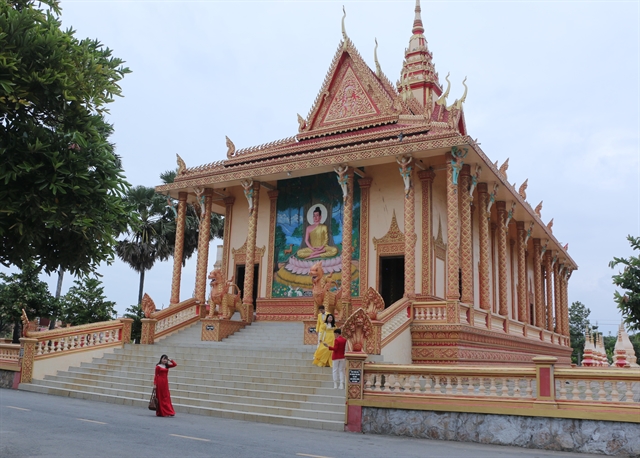 |
| Xiêm Cán Pagoda in Bạc Liêu City’s Vĩnh Trạch Đông Commune is a rural ecological tourism attraction that draws a large number of visitors. — VNA/VNS Photo Tuấn Kiệt |
BẠC LIÊU — Bạc Liêu is developing agricultural and rural tourism, which it considers to have great potential.
The Cửu Long (Mekong) Delta province has 56km of coastline, thousands of hectares of mangrove forests, fruit orchards, and fields for growing rice and other crops, and these are conducive for developing tourism products.
It has developed specific tourism products, such as cultural offerings tied to the Dạ Cổ Hoài Lang (Night Drum Beats Cause Longing for Absent Husband) song and đờn ca tài tử Nam Bộ (southern amateur singing), and experiences associated with the name Công Tử Bạc Liêu (Bạc Liêu Dandy) and spiritual tourism.
It accounts for 11 of the delta’s 43 recognised tourism destinations, the highest of any of the region’s 12 provinces and Cần Thơ City, according to the Cửu Long Delta Tourism Association.
According to Phan Thanh Duy, deputy chairman of the provincial People’s Committee, tourism is one of Bạc Liêu’s five key pillars for socio-economic development, and it aims to establish itself as a prominent tourism hub in the delta.
It is actively researching and developing tourism products related to agriculture, rural areas, ecological experiences, and community-based tourism.
Notably, products recognised under the national “One Commune, One Product” (OCOP) programme play a crucial role in promoting rural tourism by serving as popular gifts for tourists.
The province has 131 OCOP products rated between three and four stars.
With all of its 49 rural communes recognised as new-style rural communes, and 18 among them as advanced new-style rural communes, the province is making strides.
In Hồng Dân and Phước Long districts north of National Highway No. 1A, the province is focusing on the development of agricultural and rural tourism on the river and canal network in these districts which offers potential for river tours, helping take tourists to mat weaving and bamboo product weaving craft villages.
In the south of the highway, particularly in Hòa Bình and Đông Hải districts, the province is nurturing community-based tourism related to longan orchards and traditional occupations such as salt-making.
One of the country’s largest producers, Bạc Liêu is also renowned for the deliciousness of its salt, making the occupation a distinctive tourism product.
Dr. Ngô Kiều Oanh, an expert in agricultural and rural tourism, said the occupation was a specialty tourism product, and the province should build a museum to showcase it to help develop tourism.
Despite facing challenges like insufficient infrastructure and low public awareness, the province remains committed to developing agricultural and rural tourism.
To achieve this effectively, experts emphasise the need for increased advocacy activities targeting local officials, tourism service providers, the community, and tourists.
Agricultural and rural tourism development in conjunction with policies for building new-style rural areas should be a strategic focus, they say.
Trần Thị Lan Phương, director of the provincial Department of Culture, Sports, and Tourism, underscored the vast and diverse potential for developing agricultural and rural tourism in Bạc Liêu, highlighting its importance in the province’s plan to exploit and develop tourism products in tandem with building new-style rural areas.
Duy referred to local efforts to encourage farmers to convert mixed gardens into fruit orchards, switch to cultivating clean vegetables and ornamental plants, and establish farm economy models for eco-, craft village and orchard tourism.
Phương Văn Sị in Bạc Liêu City’s Vĩnh Trạch Đông Commune offers tourism services at his jujube orchard, selling the fruits at a 20-30 per cent premium over market prices.
Since he uses nets to protect the trees from pests and avoids using pesticides, the jujubes are clean and highly sought after by consumers.
“My family orchard regularly has tourists and they buy and eat the fruit [right there].”
The province is actively promoting the development of fruit orchards, including ancient longan orchards stretching seven kilometres along Provincial Road No. 38 in Bạc Liêu City’s Hiệp Thành and Vĩnh Trạch Đông communes.
These orchards boast trees aged over 100 years, making them a unique attraction in the delta.
The province has completed the first phase of a project to conserve ancient longan orchards in the two communes and covered 1,110 trees.
It has progressed to the second phase which will cover another 339 trees.
With its average annual growth of 15 per cent in tourist numbers in recent years, the province received an estimated 4.2 million visitors in 2023 and generated revenues of VNĐ3.9 trillion (US$160 million).
This places it in fourth position in the delta. VNS
- Reduce Hair Loss with PURA D’OR Gold Label Shampoo
- Castor Oil Has Made a “Huge” Difference With Hair and Brow Growth
- Excessive hair loss in men: Signs of illness that cannot be subjective
- Dịch Vụ SEO Website ở Los Angeles, CA: đưa trang web doanh nghiệp bạn lên top Google
- Nails Salon Sierra Madre
 VnExpress News The News Gateway of Vietnam
VnExpress News The News Gateway of Vietnam





